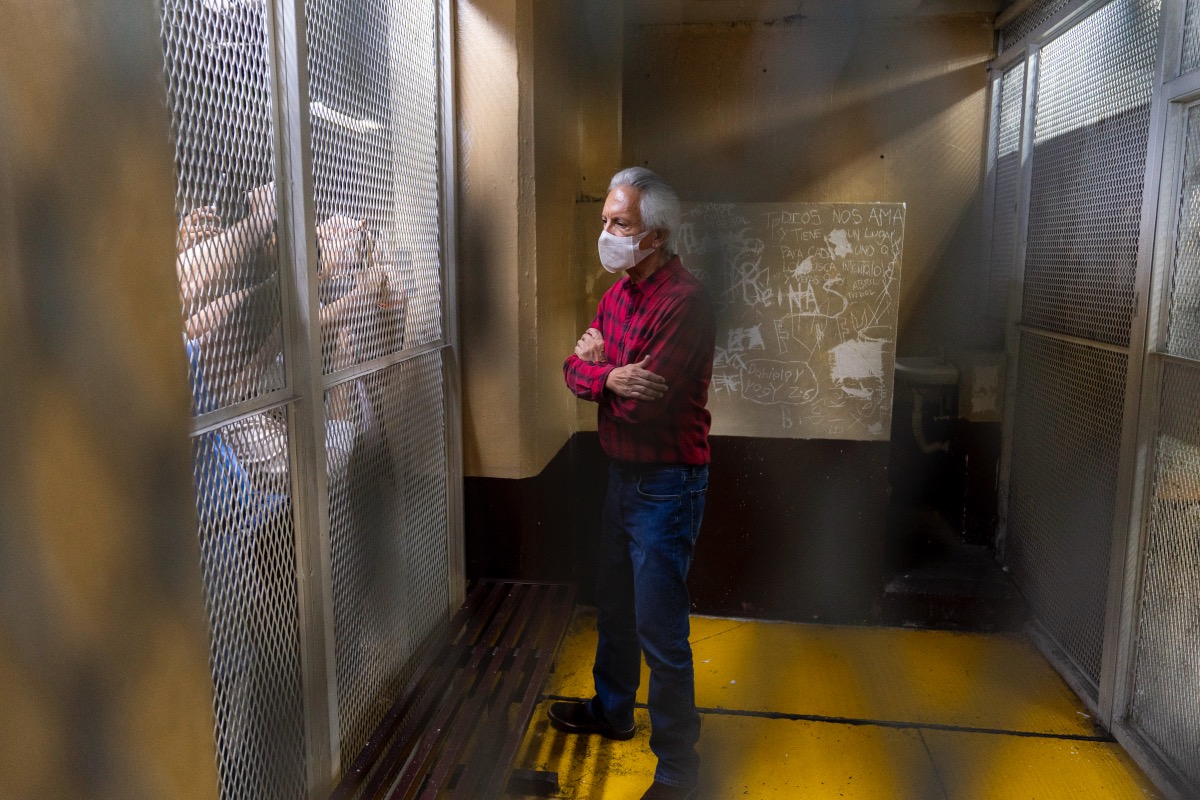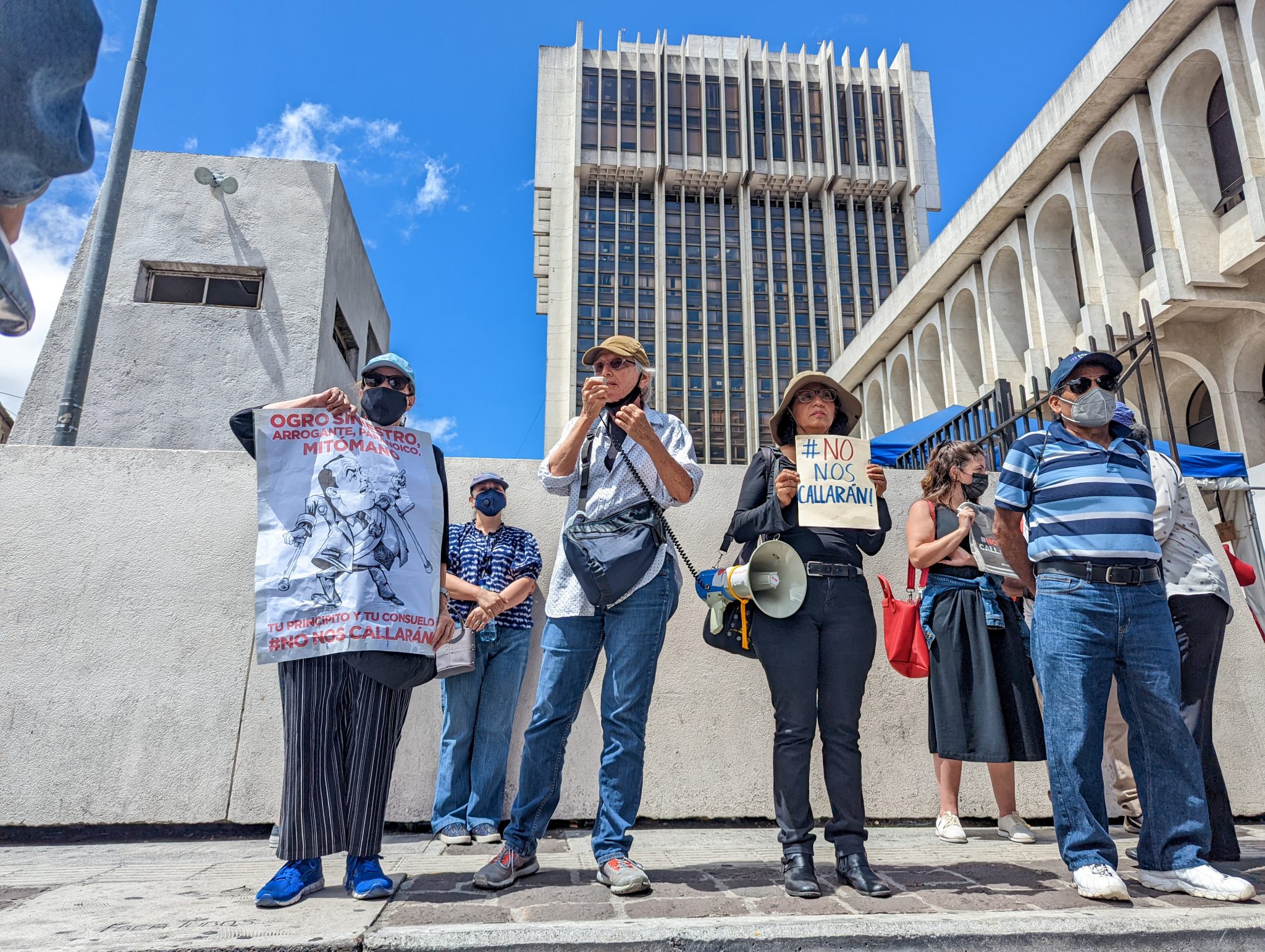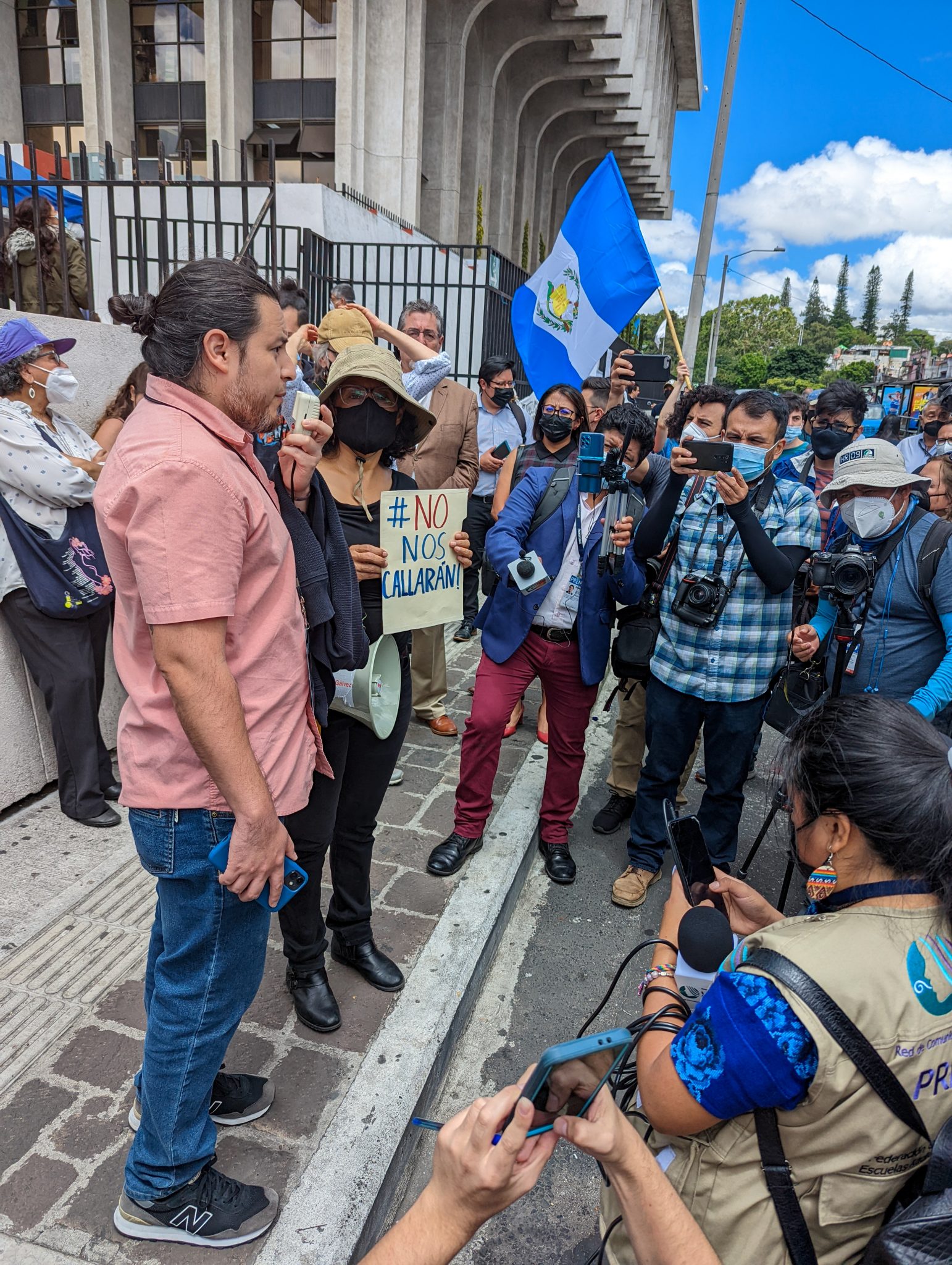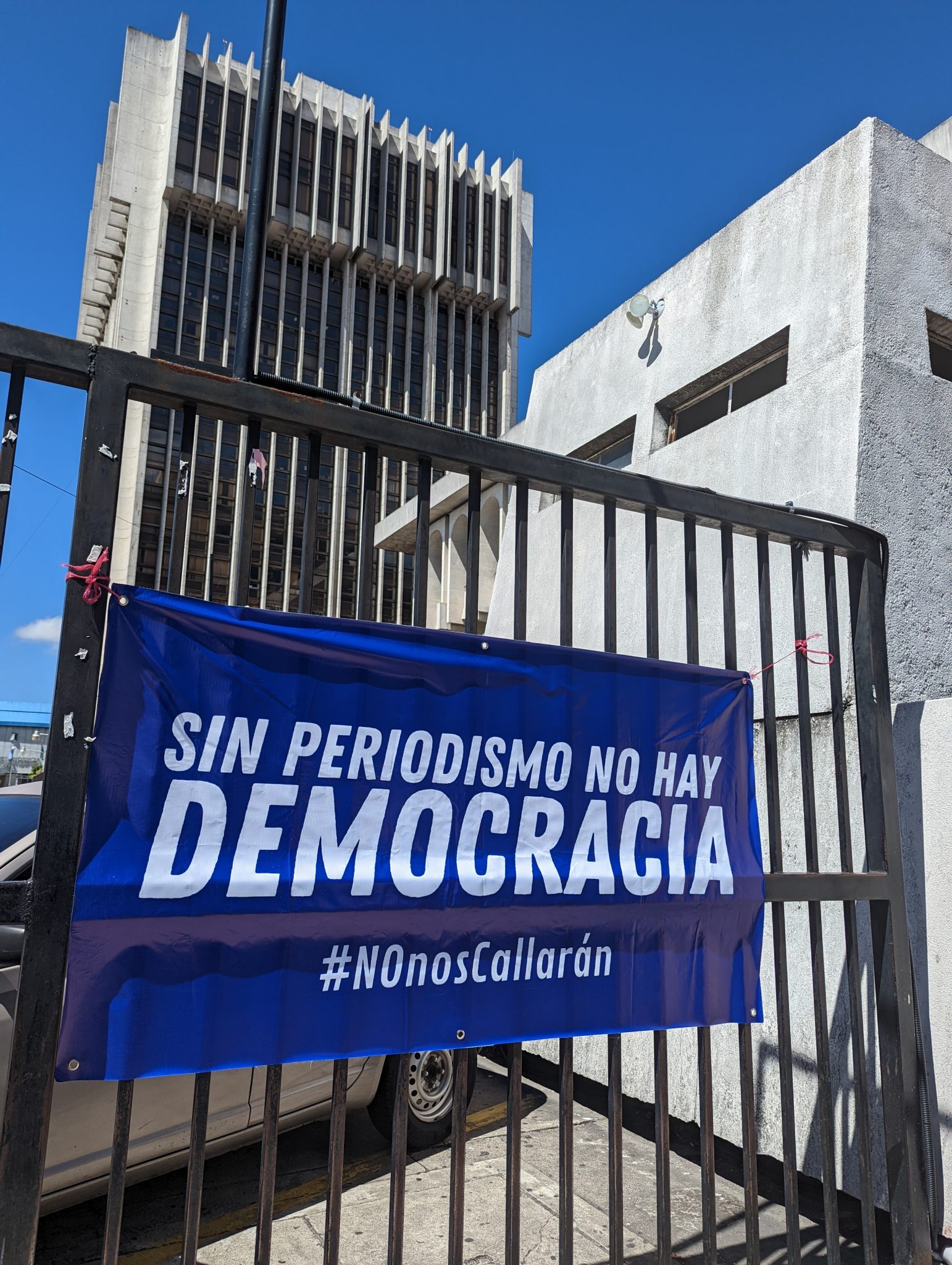

Award-winning journalist José Rubén Zamora, who was arrested the day before, stands inside a cell after a court hearing, in Guatemala City, Saturday, July 30, 2022. Politicians, anti-corruption activists and civic groups condemned the Guatemalan government’s decision to arrest the investigative journalist, who heads the newspaper El Periódico, which specializes in uncovering corruption. (AP Photo/Moises Castillo)
GUATEMALA CITY — “¡No nos callarán! ¡No nos callarán!” —They will not shut us up!— chanted dozens of concerned citizens and journalists outside the Palace of Justice in Guatemala City on Monday morning as they waited for the hearing of prominent journalist José Rubén Zamora.
The 65-year-old award-winning journalist, who is the founder and president of the newspaper El Periódico, was arrested late Friday night after his house and newspaper were raided by the Guatemalan police and Public Ministry.
He is being charged with alleged money laundering, blackmail, and influence peddling, although there is no documentation stating the reason for the exact arrest, according to a statement by the Committee to Protect Journalists (CPJ) demanding for Zamora’s release. The paperwork has been delayed because the police car transporting Zamora “broke down,” said human rights ombudsman Jordán Rodas after talking to a representative from the prison system.
Zamora declared himself a political prisoner and since his arrest has gone on a hunger strike in jail.


Three activists stand in front of the Palace of Justice to denounce the arrest of award-winning journalist José Rubén Zamora, Guatemala City, Monday, August 1, 2022. (Shahrazad Encinias/Latino Rebels)
Meanwhile, the bank accounts of El Periódico have been seized, editor Gerson Ortiz said over a megaphone outside the courts on Monday.
“They say that persecution doesn’t have anything to do with the journalistic work of José Rubén. If so, then why do they order to block the accounts of our media outlet?” Ortiz said. “We will continue to work to the best of our ability under the circumstances, and we will continue to investigate so people can continue to read El Periódico.”
Zamora was expected in court for a hearing since his arrest, but because of the missing paperwork, there was no hearing held nor was there a date set.
“All eyes are on Guatemala!” said activists Brenda Hernández, holding a Manila folder with the phrase “#NoNosCallaran” written on it in red and blue marker. The hashtag is used by a collective of journalists and activists documenting attacks against the press in Guatemala.
“#NoNosCallaran functions as a mechanism of solidarity within journos in the country,” explained activist Daniel Villatoro. “We need solidarity not just from the profession of journalism, but from the people of the country as well.”
The Zamora case has already caught the attention of several international organizations who have made public statements demanding Zamora’s immediate release. Organizations such as CPJ, the International Press Institute, Human Rights Watch, Article 19, and IFEX have joined in the public outcry denouncing the violations of press freedom in Guatemala.
The Catholic Church even condemned the persecution of the press and freedom of expression in the country.
“The government is attacking freedom of thought—let’s be clear about it. We will never be in favor of corrupt people or people that rob or are involved in crime,” said Cardinal Álvaro Leonel Ramazzini Imeri, bishop of Huehuetenango, after his sermon on Sunday. “We agree on defending freedom of expression. We don’t want to experience what is happening in Venezuela or Nicaragua… We need to respect democracy and defend our rights. These are priorities for the state of Guatemala.”
Dressed in all black, armed with a megaphone in one hand and a message of solidarity in the other, Brenda Hernández is all too familiar with the persecution of journalists. While not a reporter herself, her sister, Iduvina Hernández, is a human rights activist, columnist, professor, and journalist who was forced to flee the country during the 36-year civil war.
During the armed conflict between 1960 to 1996, more than 200,000 people were killed and over 50,000 disappeared. According to data from the Association of Journalists of Guatemala (APG), more than 500 journalists have been killed or disappeared since 1960.
Hernández describes the arrest of Zamora as the most recent case of retaliation against a journalist for their reporting in Guatemala.
“El Periódico’s staff denounced the actions and the raid on the newspaper’s offices in Guatemala City as retaliation for its previous reporting on President Alejandro Giammattei and Attorney General Consuelo Porras,” CPJ stated.


El Periodico editor Gerson Ortiz informs the crowd in front of Palace of Justice that José Rubén Zamora will not have a hearing that day and that the news outlet has had all its bank accounts seized by the government, Guatemala City, Monday, August 1, 2022. (Shahrazad Encinias/Latino Rebels)
This is not the first time that Zamora is arrested after publishing critical reporting about elected officials.
In 2014, then-President Otto Pérez Molina and Vice President Roxana Baldetti filed criminal complaints against Zamora accusing him of blackmail, coercion, and contempt, among other things. He was also accused of femicide for intimidating the female vice president in his coverage.
All charges were dropped against him, and a few months later, both the president and vice president were stripped of their diplomatic immunity, arrested, and jailed, charged with corruption and a number of other crimes.
The criminalization of journalists in Guatemala has increased under the current administration of President Giammattei. Since he took office in 2020, there have been 350 registered attacks against the press, according to a report from the APG, with the group registering 66 violations against journalists just this year.
The APG describes attacks as “hate campaigns on social media, monitoring people who inconvenience the authorities, withholding or denying public information by officials, banning the press from entering public events, lack of interest by the Public Ministry to prosecute the attacks and crimes against journalists, and in recent months, the increase in a confrontational discourse that appeals to the ‘defense of national sovereignty’ and intends to implant in the social imaginary as ‘enemies of democracy’ and ‘destabilizers’ of the government.”
Freedom of the press is protected under Article 35 of the Guatemalan Constitution, yet journalists remain under attack. Reporters Without Borders has ranked the country 124 out of 180 in press freedom for 2022, down eight spots from last year.


#NoNosCallaran banner hangs in front of the Palace of Justice during a peaceful protest in solidarity with jailed journalist José Rubén Zamora, Guatemala City, Monday, August 1, 2022. (Shahrazad Encinias/Latino Rebels)
Last week, Guatemalan journalist Irma Velásquez Nimatuj was detained and expelled from Nicaragua upon arrival at the airport. While the rest of the world made public outcries against her inhumane treatment by President Daniel Ortega, there has ben silence from the Guatemalan government.
Maya Q’eqchi’ journalist Carlos Ernesto Choc Chub was accused in March of “instigation to commit a crime.” The charge came in connection to accusations made against him in October, when he was reported about acts of violence against locals in the community of El Estor by the mining corporation Solway Investment Group.
He has to present himself to the Public Ministry every month and check in by signing a book, supposedly to keep tabs on him and prevent him from fleeing the country.
“They (journalists) are being harassed because they bother those in power. They are obstacles for this criminal policy that has appropriated the state,” said Bernardo Arévalo, deputy of the Guatemalan Congress from the Movimiento Semilla party. “We have to say enough already with the corruption. Enough already with the construction of a dictatorship and authoritarian regime. And we have to say it, ‘¡No nos callarán!‘”
***
Shahrazad Encinias is a bilingual multimedia journalist who reports on social justice, environmental justice, and human rights. She is currently based in Guatemala. Twitter: @ShaEnci


